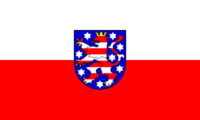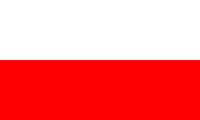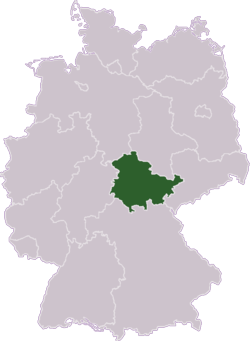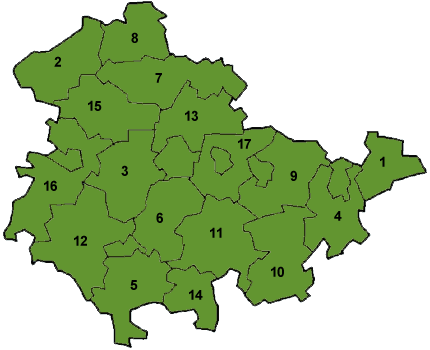Thuringia
|
|
| State Service Flag | |
|---|---|
 | |
| Civil Flag | |
 | |
| Statistics | |
| Capital: | Erfurt |
| Area: | 16,171 km² |
| Inhabitants: | 2 392 000 (2003) |
| pop. density: | 148 people/km² |
| Homepage: | thueringen.de (http://www.thueringen.de/) |
| ISO 3166-2: | DE-TH |
| Politics | |
| Minister-president: | Dieter Althaus (CDU) |
| Ruling party: | CDU |
| Map | |
 | |
The Free State of Thuringia (German: Freistaat Thüringen) lies in central Germany and is among the smaller of the country's sixteen Bundesländer (federal states), with an area of 16,200 km² and 2.45 million inhabitants. The capital is Erfurt.
| Contents |
Geography
Thuringia borders on (from the north and clockwise) the German states of Lower Saxony, Saxony-Anhalt, Saxony, Bavaria and Hesse. The major cities include Erfurt (200,000), Gera (110,000), Jena (103,000), Weimar (64,000), Gotha (50,000), Eisenach (44,200) and Suhl (46,700).
The most conspicuous geographical feature of Thuringia is the Thuringian Forest (Thüringer Wald), a mountain chain in the southwest. In the northwest Thuringia includes a small part of the Harz mountains. The eastern part of Thuringia is generally plain. The Saale river runs through these lowlands from south to north.
See also List of places in Thuringia.
Thuringia is divided into 17 districts (Landkreise):

Furthermore there are six independent towns, which don't belong to any district:
History
Named after the Thuringian people who occupied it around 300 AD, Thuringia came under Frankish domination in the 6th century, forming a part (from 1130 a landgravate) of the subsequent Holy Roman Empire. After the extinction of the reigning Ludowing line of counts in 1247 and the War of the Thuringian Succession (1247-64), the western half became independent under the name of Hesse, never to become a part of Thuringia again. Most of the remaining Thuringia came under the rule of the Wettin dynasty of nearby Meissen, the nucleus of the later duchy and kingdom of Saxony. With the division of the house of Wettin in 1485, Thuringia went to the senior Ernestine branch of the family, which subsequently subdivided the area into a number of smaller states, according to the Saxon tradition of dividing inheritance amongst male heirs. These were the Saxon Duchies. They consisted of the states of Saxony-Weimar, Saxony-Meiningen, Saxony-Altenburg, Saxony-Coburg, Saxony-Gotha, Schwarzburg-Sondershausen, Schwarzburg-Rudolstadt and the two principalities of Reuß. They now constitute the German state of Thuringia. 'Thuringia' became merely a geographical concept.
Within the Napoleonic Confederation of the Rhine organized in 1806, some reordering of territories began, confirmed at the Congress of Vienna (1814-15) with the creation of the German Confederation.
The Thuringian states within the German Empire were Saxe-Weimar-Eisenach, Saxe-Meiningen, Saxe-Altenburg, Saxe-Coburg-Gotha, Schwarzburg-Sondershausen, Schwarzburg-Rudolstadt and the two principalities of Reuß.
In the Weimar Republic that followed World War I, these dynastic mini-states were dissolved. Thuringia re-emerged as a political entity in 1920, when the state of Thuringia was established by merging the hereditary territories; only the southernmost parts of Saxe-Coburg-Gotha voted to join Bavaria. The city of Erfurt, although enclosed by Thuringian territory, remained a part of Prussia. Weimar became the new capital of Thuringia.
The state of Thuringia, under Soviet occupation after 1946, was broken into three districts in 1952 under an East German administrative restructuring. It was restored on Germany's reunification in 1990.
List of minister presidents of Thuringia
- 1920 - 1921: Arnold Paulssen (DDP)
- 1921 - 1923: August Frölich (SPD)
- 1924 - 1928: Richard Leutheußer (DVP)
- 1928 - 1929: Karl Riedel (DVP)
- 1929: Arnold Paulssen (DDP)
- 1930 - 1932: Erwin Baum (Landbund)
- 1932 - 1933: Fritz Sauckel (NSDAP)
- 1933 - 1945: Willy Marschler (NSDAP)
- 1945: Hermann Brill (SPD)
- 1945 - 1947: Rudolf Paul (no party, then LDPD)
- 1947 - 1952: Werner Eggerath (SED)
- 1990 - 1992: Josef Duchac (CDU)
- 1992 - 2003: Bernhard Vogel (CDU)
- since 2003: Dieter Althaus (CDU)
External links
- Official governmental portal (http://www.thueringen.de/)
- Touristical website for Thuringia (German) (http://www.thueringen.info/)
- Alternative Touristical website for Thuringia (German, English) (http://www.thueringen-tourismus.de/)
- Thuringia at www.dmoz.org (http://dmoz.org/Regional/Europe/Germany/States/Thuringia/)
- Thuringian flags at [1] (http://fotw.vexillum.com/flags/de-th.html) and [2] (http://www.flaggenkunde.de/deutscheflaggen/de-th.htm)
Template:Germany statesar:تورنغن ca:Turíngia da:Thüringen de:Thüringen et:Tüüringi es:Turingia eo:Turingio fr:Thuringe id:Thüringen it:Turingia he:תורינגיה ka:თიურინგია la:Thuringia nl:Thüringen nds:Thüringen ja:テューリンゲン州 no:Thüringen pl:Turyngia ro:Turingia ru:Тюрингия simple:Thuringia sr:Тургинија sv:Thüringen
